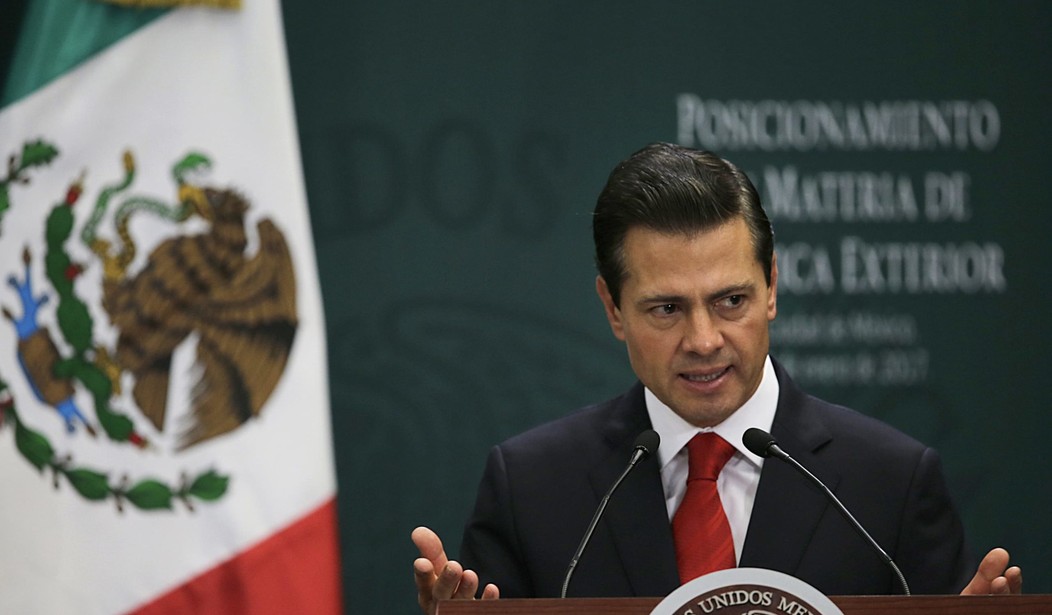WASHINGTON — The Mexican government said President Enrique Peña Nieto and President Trump “agreed at this point not to speak publicly about this controversial issue” of how the border wall will be funded.
Peña Nieto canceled his planned trip to the United States after Trump issued his executive order on construction of the border wall: “This morning we have informed the White House that I will not attend the meeting scheduled for next Tuesday with the @POTUS,” he tweeted Thursday.
Trump later told Republican lawmakers at the congressional retreat in Philadelphia that “the president of Mexico and myself have agreed to cancel our planned meeting scheduled for next week.”
“Unless Mexico is going to treat the United States fairly, with respect, such a meeting would be fruitless and I want to go in different route,” he added. “We have no choice.”
Peña Nieto’s office announced that the presidents spoke for an hour this morning and “had a constructive and productive conversation about the bilateral relationship between the two countries, including the United States of America trade deficit with Mexico, the importance of friendship between our nations, and the need for our countries to work together to stop drug trafficking and the illegal flow of arms.”
“With regard to the payment of the border wall, both presidents acknowledged their clear and very public differences in position on this sensitive issue and agreed to resolve these differences as part of a comprehensive discussion of all aspects of the bilateral relationship. The presidents also agreed at this point not to speak publicly about this controversial issue,” the statement continued.
The White House joint statement, issued after the Mexican government statement, omitted the last line.
“Both presidents have instructed their teams to continue the dialogue to strengthen this important strategic and economic relationship in a constructive way.”
At a news conference with British Prime Minister Theresa May, Trump said he “had a very good call” with his Mexican counterpart.
“I have been very strong on Mexico. I have great respect for Mexico. I love the Mexican people. I work with the Mexican people all the time. Great relationships,” Trump said. “But, as you know, Mexico with the United States has outnegotiated us and beat us to a pulp through our past leaders. They’ve made us look foolish. We have a trade deficit of $60 billion with Mexico. On top of that, the border is soft and weak, drugs are pouring in, and I’m not going to let that happen.”
Trump said he thinks he has “a very good relationship” with Peña Nieto and “we are going to be working on a fair relationship and a new relationship.”
“But the United States cannot continue to lose vast amounts of business, vast amounts of companies, and millions and millions of people losing their jobs,” he added. “That won’t happen with me. We’re no longer going to be the country that doesn’t know what it’s doing.”
On board Air Force One on Thursday, White House press secretary Sean Spicer mused that “if you tax at 50 percent — $50 billion at 20 percent of imports — which is, by the way, a practice that 160 other countries do — right now our country’s policy is to tax exports and let imports flow freely in, which is ridiculous, but by doing it that way we can do $10 billion a year and easily pay for the wall just through that mechanism alone.”
Sen. Bob Menendez (D-N.J.), ranking member on the Senate Foreign Relations Western Hemisphere subcommittee, told CNN that consumers would suffer “because the imports that come from Mexico, particularly in food product among others, are ultimately going to be far more expensive for the consumer.”
“So, they’ll slap 20 percent on the $267 billion that the United States sells in goods and services to their country. Those are goods and services made by Americans here. Jobs in the United States,” Menendez said. “And at the end of the day, if that’s what’s going to happen, American workers suffer.”









Join the conversation as a VIP Member